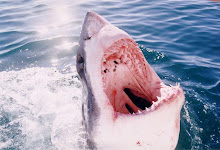When a whale carcass was towed to Seal Island in False Bay, known as a spot where great white sharks hunt, one might have expected a feeding frenzy with the big predators fighting each other and ripping into whatever they could bite off.
Turns out this was not the case. According to Alison Kock, principal scientist of the Save Our Seas Shark Centre and Shark Spotting Programme, the sharks were highly selective in what part of the whale they ate, and showed very little aggression towards each other.
"Contrary to their reputation as mindless killers, the level of selectivity for which parts of the dead whale they ate was extraordinary.
"They targeted the energy-rich blubber, often making repeated 'test bites' where no flesh was removed, and removing flesh only once they had determined it was what they wanted. If they got a mouthful of muscle, they often spat it out," Kock said yesterday.
The 11m dead Brydes whale was spotted a couple of weeks ago by Chris Fallows of Apex Expeditions floating towards Miller's Point. Had it washed ashore, the authorities would have had to remove the carcass, a time-consuming and expensive operation. The authorities therefore gave permission for the SA Navy to tow the whale to Seal Island, where the sharks could dispose of the carcass by feeding on it.
"And it gave us a great opportunity to document white shark behaviour and record the number of sharks in the area," Kock said.
Over nine days she recorded 30 different sharks feeding on the whale. Each shark's dorsal fin is different, providing a kind of "fingerprint". Many Kock recognised, but some she had not seen before.
"I was surprised by the number of white sharks that fed on it. They showed very little aggression toward one another, often feeding side by side."
Their highly selective feeding, spitting out muscle if they bit into it by mistake, may shed light on why over 70 percent of white shark attacks on people are "bite and release", Kock said.
"It is evidence that when they bite into a surfboard, or kayak or person wearing a wetsuit, they can immediately determine it's not something they want to eat," she said.
The sharks reduced the 11m whale carcass to 2m of muscle and bone in nine days.
melanie.gosling@inl.co.za
• This article was originally published on page 1 of Cape Times on September 20, 2010
Subscribe to:
Post Comments (Atom)






No comments:
Post a Comment